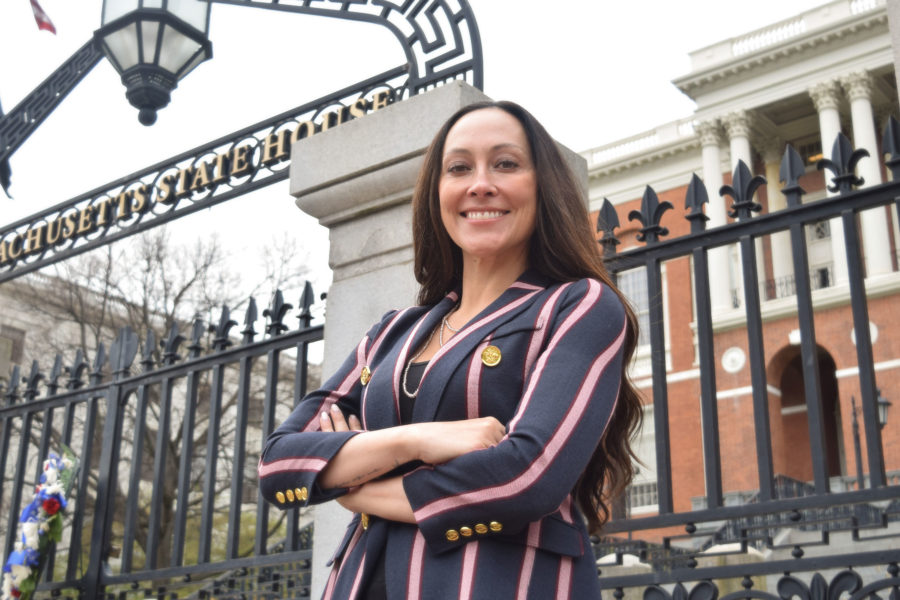When doctors at Massachusetts General Hospital pored over Jessica Diaz’s stroke case in 2013, they observed the odds may have been stacked against her. Only 36 years old, she had suffered a minor stroke due to a diagnosed blood clotting disorder and a patent foramen ovale, known as a tiny hole in her heart.
But, if you take a look at Diaz’s entire life and her ultimate survival, which includes two healthy children, a loving marriage, an active career as a barre instructor and, recently, a passion for public health policy, it’s clear that she beat out those odds and came out on top, stronger than ever.
Diaz is currently pushing for legislative action at the Massachusetts State House to pass a bill that could potentially prevent strokes among women. This bill, called An Act Relative to Testing for Factor V Leiden, was filed by Rep. Daniel Ryan (D) in January 2019 and co-signed by several other legislators.
The bill states: “…before anyone is able to be prescribed any pharmacological contraceptive methods a blood test to screen for Factor V Leiden (FVL) shall be performed.”
In other words, before any health care provider in Massachusetts prescribes hormonal birth control, they would be required to first check if the patient has FVL — the same blood clotting disorder that Diaz lives with — which, in conjunction with birth control, puts the woman at significantly higher risk for stroke.
Prior to the bill’s filing, Diaz spent four years researching, consulting physicians and lobbying for it. Although the law still has a long way to go through the system, Diaz considers this a victory and wants to do all she can to educate as many women as she can.
When talking to some professionals in the medical field, she explains, “They would say, ‘It’s too expensive to test people,’ but that just wasn’t good enough of a reason for me.”
“Women deserve better. We’re not informed enough about all of the risks when taking the pill,” says Diaz, and how those risks can significantly increase if you have FVL.
The Facts
Factor V Leiden is a 20,000-year-old gene mutation. Someone might carry the gene and never be affected by it, but when activated, it can accelerate blood clotting. It can also increase the risk of miscarriage and stillbirth.
Factors that activate the gene are conditions that mostly affect women such as increases in estrogen due to pregnancy or birth control. In addition, the FVL gene can be triggered if a person remains immobile for long stretches of time, experiences a trauma, or undergoes surgery.
According to a paper published in Genetics in Medicine, a peer-reviewed medical journal, heterozygosity (one copy of a gene inherited from a parent) for Factor V Leiden occurs in 3 percent to 8 percent of the general U.S. and European populations, with the highest frequency among caucasian Americans at 5.2 percent.
Women with heterozygous FVL, who also use oral birth control, have an estimated 30- to 50-fold increased risk of blood clots, according to an article in Blood, a journal for the American Society of Hematology.
Alarmingly, that risk becomes several-hundred fold for women with homozygous FVL (two copies of the gene) and who also take birth control.

Women with heterozygous FVL, who also use oral birth control, have an estimated 30- to 50-fold in-creased risk of blood clots, which can lead to stroke.
Putting Together the Puzzle
When doctors zeroed-in on why Diaz had a stroke at such an early age, they not only attributed it to the tiny hole in her heart, but her heterozygous FVL as well.
“When I met with my hematologist, she told me I could never take the pill again, do any hormone replacement or get pregnant again,” says Diaz.
She began putting together how FVL had insidiously impacted her health throughout her life.
To treat painful menstrual cramps, Diaz was put on the pill at age 16. “There was never, let’s try something else first. They just gave it to me,” she says.
She stayed on the pill for 10 years, until she started forming her family. But, the effects of the pill and FVL had already taken its toll. In between her first and second child, Diaz experienced a late miscarriage, she says. “I now believe [it] was related to this, but I didn’t know it at the time.”
Although Diaz couldn’t save her previous pregnancy, she was determined to save her sister’s. Around the same time Diaz was diagnosed with FVL, her sister found out she was pregnant, after going through two rounds of IVF.
“So she was pumped with a ton of hormones,” says Diaz. She immediately urged her sister to test for FVL, and, when the test came out positive, the mother-to-be went on blood thinning injections for a year.
Thankfully, Diaz still has her sister by her side, as well as a healthy six-year-old niece.
“My niece was the silver living in my stroke story. If I had a stroke, even without all those hormones, what would have happened to my sister?” she asks.
How many other women could be unwittingly increasing their risk of miscarriages and blood clotting? Diaz wondered.
As a stroke survivor and spokesperson for the American Heart Association, Diaz got involved in lobbying for a more robust health care and stroke care system.
“I got an idea of how politics work locally, and I saw an opportunity to start talking to my local representative, Dan Ryan, to make him aware of this issue,” she says.
Rep. Ryan was receptive, but it was up to Diaz to convince him about the importance of filing a bill to mandate health care providers to test patients for FVL before prescribing birth control.
“There are millions of women on birth control who are thinking, ‘this is good for me,’ when it might not be,” says Diaz.
The Opposition
As of today, there is no existing policy for screening women for FVL prior to giving women the birth control pill.
Diaz says the opposing argument to a policy like this usually relies on a cost-benefit analysis of preventing the death of one person. For some policy makers, Diaz says, the costs of testing women for FVL at $80 to $150 per test doesn’t justify the benefit of possibly saving at least one person from stroke.
And, it’s not that health care providers never test for blood clotting disorders before prescribing hormonal birth control — they do — but only if there is a family history of blood clotting.
“That model, relying on family history, isn’t the safest way to go,” says Diaz, who does not have any family members who have experienced blood clotting or stroke.
Throughout the four years of lobbying for this bill, Diaz admits she was almost held back by self-doubt. “There were a few people that made me feel like I was silly for even thinking of this. I heard a lot of no’s,” she says.
Sticking to her guns, she carried on, keeping in constant touch with her representatives in the State House and their aides, and gathering research, evidence and testimonies to build her case.
This upcoming fall season, she’ll get the chance to make her case during a hearing for the proposed bill.
The Real Stories
Since the FVL bill was filed, Diaz has received many messages from families all over the country who have been directly affected by undiagnosed FVL and birth control.
“I heard from two pairs of parents, one from New Jersey and the other from Texas, who lost their daughters from massive strokes,” says Diaz. “One was 16 and the other was 22. They were taking birth control and had undiagnosed FVL.”
“There are a lot of stories like that,” she adds.
Diaz also heard from a woman in Pennsylvania who caught wind of Diaz’s work pushing for a FVL testing policy and now wants to bring up the same issue in her local government.
“It sounds so inaccessible, but anyone can try to make real change through policy and law,” says Diaz. “Working with your local representatives is the best way.”
Ideally, Diaz would want FVL blood tests to be covered by insurance companies, but she’s aware of the uphill battle. Even mandating health care providers to conduct the test itself will be challenge, she says, “since nobody wants to be mandated to do anything.”
“I would want to give people, at least, the option of having the test and being made aware of the risks,” says Diaz. “We all deserve to make an informed decision about our health.”



 7 min read
7 min read


